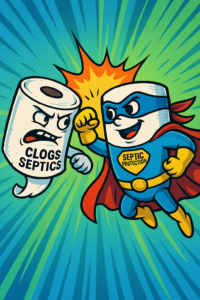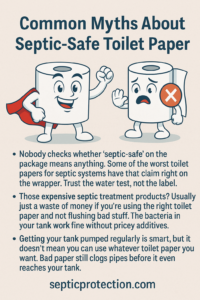Best Toilet Paper for Septic Tanks (And What to Avoid)
That super-soft toilet paper might feel great on your behind, but it’s brutal on your septic system. Most folks have no idea they’re flushing trouble down their toilets every day — and it’s exactly why choosing the best toilet paper for septic tanks matters more than you think.
When septic systems fail, fixing them costs thousands. All because of something as simple as toilet paper choice.
 Why Toilet Paper Matters in a Septic System
Why Toilet Paper Matters in a Septic System
Your septic tank isn’t some magical disappearing chamber. It’s just a big container where waste sits while bacteria eat it up. Those fancy toilet papers – the ultra-soft, triple-ply, quilted kind – are made to stay strong when wet.
Problem is, stuff that stays strong when wet doesn’t break down in your tank. The bacteria can’t eat it fast enough. It builds up, and clogs pipes. And soon you’re calling a pump truck a lot more often than you should be. And before you know it, a total system failure in your yard.
How to Test Toilet Paper at Home
Want to know if your toilet paper is septic-friendly? Try this:
Grab some toilet paper. Drop it in water. Stir it around. Good paper falls apart fast. Bad paper stays together like a wet rag.
That’s pretty much what happens in your pipes and tank. Simple physics.
Toilet Paper That’s Safe for Septic Systems
Thin paper breaks down fast. The 1-ply stuff might not feel like wiping with a cloud, but it dissolves almost right away in water. Your septic system loves that.
Recycled toilet paper works great too. Those fibers are already processed once, so they come apart easier in water.
Plain paper without all the fancy additives breaks down better. Lotions, perfumes and fancy textures just slow down breakdown.
Toilet Paper (and Wipes) That Damage Septic Systems
The super-plush stuff with multiple layers is terrible for tanks. The makers design it not to break down when wet. It feels nice on your rear but ruins your plumbing.
Those quilted patterns? They’re made by gluing paper layers together tight. Again, built specifically to stay together in water.
Common Myths About Septic-Safe Toilet Paper
Nobody checks whether “septic-safe” on the package means anything. Some of the worst toilet papers for septic systems have that claim right on the wrapper. Trust the water test, not the label.
Those expensive septic treatment products? Usually just a waste of money if you’re using the right toilet paper and not flushing bad stuff. The bacteria in your tank work fine without pricey additives.
Getting your tank pumped regularly is smart, but it doesn’t mean you can use whatever toilet paper you want. Bad paper still clogs pipes before it even reaches your tank.
Septic Care Beyond Toilet Paper
Good toilet paper helps, but watch these other things, too: Do not put wipes in the toilet, even ones called “flushable.” Do not use feminine products or dental floss. Spread laundry across different days. Keep cooking grease out of your sink. Get your tank pumped before problems start. Go easy on bleach and harsh cleaners.
Buying Guide: Toilet Paper That Won’t Ruin Your System
Simple answer? Get thin toilet paper. Get recycled toilet paper with no fancy stuff added. Find toilet paper that breaks apart fast in water.
Stay away from the super-fluffy stuff. Skip anything quilted or cushioned. Avoid papers with lotions or perfumes. Never flush those “flushable” wipes.
Do that water test. If your toilet paper doesn’t start falling apart in water within a minute, it’s not breaking down in your septic tank either.
Septic systems cost too much to replace. Using the right toilet paper is a cheap fix that prevents expensive problems down the road.
- Septic Tank Additive
- How to Budget for Your Septic System the Smart Way
- Septic Tank Replacement Cost
- Septic System Inspection Checklist
- How Often to Pump Septic Tank
- Buying a Home with a Septic Tank
- Pros and Cons of Septic Systems
- Septic Tank Install Is It Right for Your Rural Property?
- Off Grid Septic System 7 Reasons Why It Makes Sense
- Septic vs Sewer
- Septic vs Public Sewer
- How a Septic System Works
- Professional Septic Tank Cleaning
- Septic Tank Installation
- Septic Tank Maintenance Products
- Septic Tank Insurance
- DIY Septic System
- How Do Septic Tanks Work
